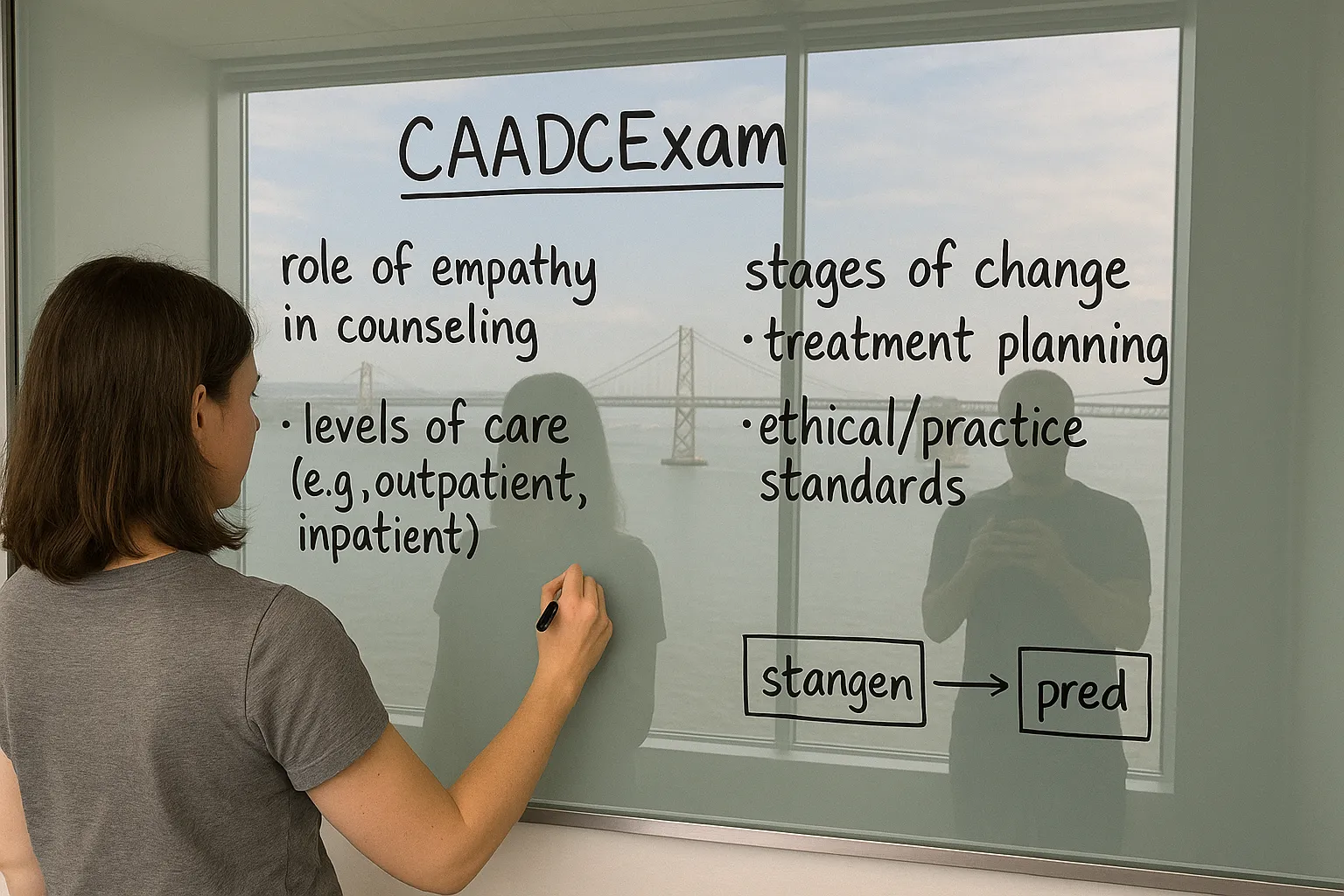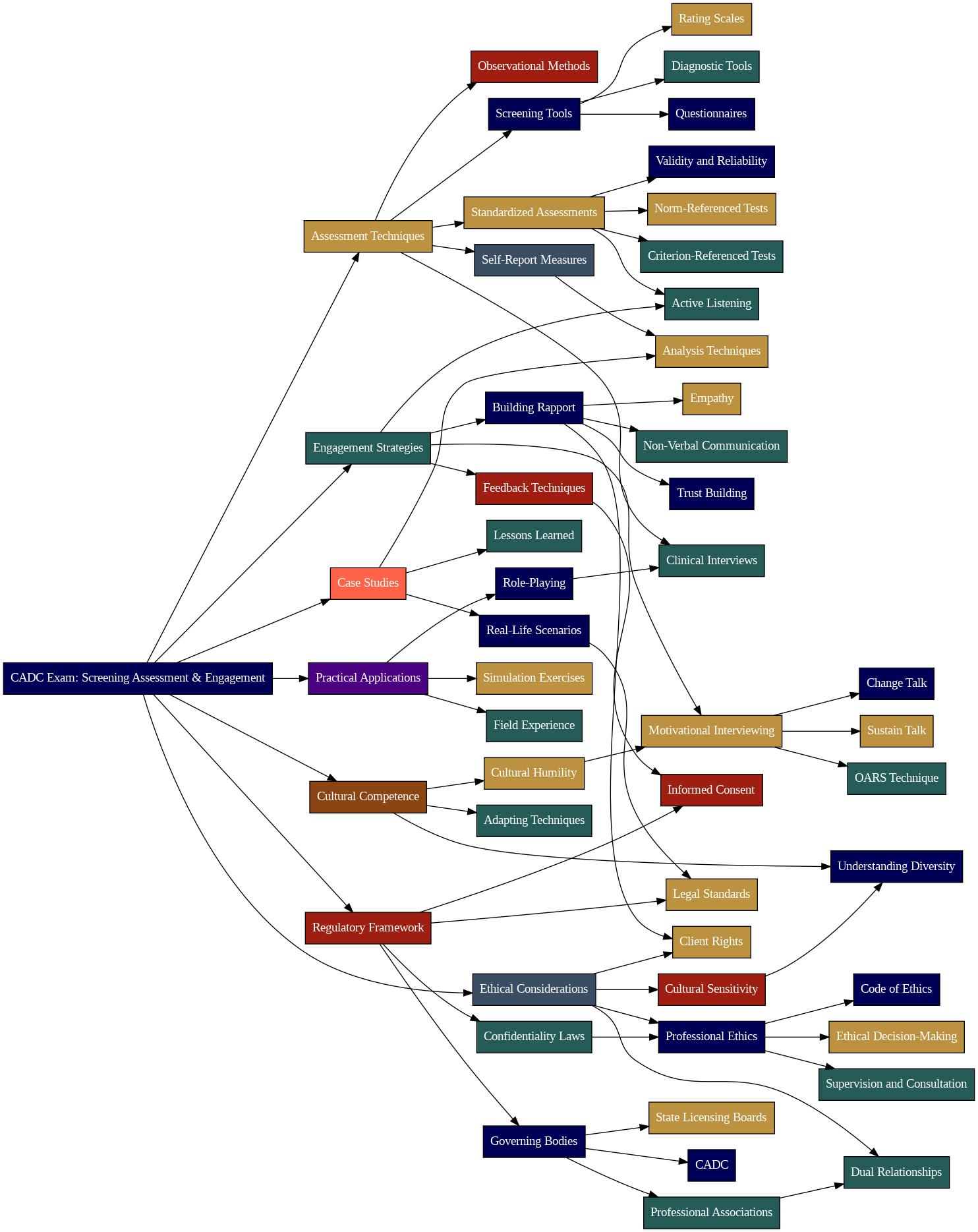Quiz-summary
0 of 30 questions completed
Questions:
- 1
- 2
- 3
- 4
- 5
- 6
- 7
- 8
- 9
- 10
- 11
- 12
- 13
- 14
- 15
- 16
- 17
- 18
- 19
- 20
- 21
- 22
- 23
- 24
- 25
- 26
- 27
- 28
- 29
- 30
Information
Premium Practice Questions
You have already completed the quiz before. Hence you can not start it again.
Quiz is loading...
You must sign in or sign up to start the quiz.
You have to finish following quiz, to start this quiz:
Results
0 of 30 questions answered correctly
Your time:
Time has elapsed
Categories
- Not categorized 0%
- 1
- 2
- 3
- 4
- 5
- 6
- 7
- 8
- 9
- 10
- 11
- 12
- 13
- 14
- 15
- 16
- 17
- 18
- 19
- 20
- 21
- 22
- 23
- 24
- 25
- 26
- 27
- 28
- 29
- 30
- Answered
- Review
-
Question 1 of 30
1. Question
Dr. Anya Sharma, a Licensed Master Level Psychologist (LMLP) in Kansas, is working with a 35-year-old client, Ben, who reveals during a session that he was sexually abused by a family member when he was a child. Ben states that the abuse occurred between the ages of 8 and 12. He clarifies that the abuser is no longer in contact with any children and poses no current threat to minors. According to Kansas statutes and ethical guidelines for LMLPs, what is Dr. Sharma’s *most* appropriate course of action?
Correct
According to Kansas statutes and regulations governing LMLPs, a psychologist must maintain client confidentiality, adhering to both HIPAA and state-specific laws. This includes securely storing records and obtaining informed consent before disclosing any information, even in legal contexts. However, there are exceptions to confidentiality, such as when there is a reasonable suspicion of child abuse, elder abuse, or a credible threat of harm to self or others. In such cases, the psychologist has a legal and ethical duty to report the information to the appropriate authorities. Consultation with colleagues or legal counsel is advisable when navigating complex ethical dilemmas. The Kansas Board of Behavioral Sciences also provides guidance on ethical practice. Failing to report suspected abuse or threatened harm could result in legal and ethical sanctions. In this scenario, Dr. Anya Sharma is faced with a situation where a client discloses past child abuse, but the client is now an adult. The crucial factor is whether there is an ongoing risk to a child. If the abuse is historical and there is no current threat to a minor, mandatory reporting is not required. However, Dr. Sharma still has an ethical obligation to explore the impact of the past abuse on the client and provide appropriate therapeutic support. If, however, the client’s disclosure suggests they are currently abusing a child or plan to, Dr. Sharma must report it.
Incorrect
According to Kansas statutes and regulations governing LMLPs, a psychologist must maintain client confidentiality, adhering to both HIPAA and state-specific laws. This includes securely storing records and obtaining informed consent before disclosing any information, even in legal contexts. However, there are exceptions to confidentiality, such as when there is a reasonable suspicion of child abuse, elder abuse, or a credible threat of harm to self or others. In such cases, the psychologist has a legal and ethical duty to report the information to the appropriate authorities. Consultation with colleagues or legal counsel is advisable when navigating complex ethical dilemmas. The Kansas Board of Behavioral Sciences also provides guidance on ethical practice. Failing to report suspected abuse or threatened harm could result in legal and ethical sanctions. In this scenario, Dr. Anya Sharma is faced with a situation where a client discloses past child abuse, but the client is now an adult. The crucial factor is whether there is an ongoing risk to a child. If the abuse is historical and there is no current threat to a minor, mandatory reporting is not required. However, Dr. Sharma still has an ethical obligation to explore the impact of the past abuse on the client and provide appropriate therapeutic support. If, however, the client’s disclosure suggests they are currently abusing a child or plan to, Dr. Sharma must report it.
-
Question 2 of 30
2. Question
An LMLP in Kansas, Dr. Anya Petrova, receives a request from a client’s insurance company for detailed session notes to justify continued treatment authorization. What is Dr. Petrova’s MOST ethically and legally sound course of action regarding the release of this information, according to HIPAA regulations and professional standards?
Correct
The Health Insurance Portability and Accountability Act (HIPAA) Privacy Rule establishes national standards for protecting the privacy of individually identifiable health information. In Kansas, LMLPs must comply with HIPAA regulations, which include obtaining informed consent from clients before disclosing their protected health information (PHI). Exceptions to this rule exist, such as when disclosure is required by law (e.g., reporting child abuse) or to prevent serious harm to the client or others. However, in most routine situations, the LMLP must obtain the client’s authorization before sharing information with third parties, including insurance companies, family members, or other healthcare providers. The authorization must be specific, outlining the information to be disclosed, the purpose of the disclosure, and the recipient of the information. Clients have the right to access their own records and to request amendments if they believe the information is inaccurate or incomplete. LMLPs must also implement administrative, technical, and physical safeguards to protect the confidentiality of client information.
Incorrect
The Health Insurance Portability and Accountability Act (HIPAA) Privacy Rule establishes national standards for protecting the privacy of individually identifiable health information. In Kansas, LMLPs must comply with HIPAA regulations, which include obtaining informed consent from clients before disclosing their protected health information (PHI). Exceptions to this rule exist, such as when disclosure is required by law (e.g., reporting child abuse) or to prevent serious harm to the client or others. However, in most routine situations, the LMLP must obtain the client’s authorization before sharing information with third parties, including insurance companies, family members, or other healthcare providers. The authorization must be specific, outlining the information to be disclosed, the purpose of the disclosure, and the recipient of the information. Clients have the right to access their own records and to request amendments if they believe the information is inaccurate or incomplete. LMLPs must also implement administrative, technical, and physical safeguards to protect the confidentiality of client information.
-
Question 3 of 30
3. Question
Dr. Sato, an LMLP in Kansas, receives a subpoena from an attorney requesting the complete clinical record of her client, Ms. Dubois, for a court case. Ms. Dubois has not provided authorization for the release of her records. According to HIPAA regulations applicable to LMLPs in Kansas, what is Dr. Sato’s MOST appropriate initial course of action?
Correct
In Kansas, the Health Insurance Portability and Accountability Act (HIPAA) Privacy Rule applies to LMLPs as covered entities. This means they must comply with federal regulations regarding the protection of clients’ protected health information (PHI). The HIPAA Privacy Rule grants clients specific rights regarding their PHI, including the right to access their records, request amendments to their records, and receive an accounting of disclosures of their PHI. It also requires LMLPs to provide clients with a Notice of Privacy Practices that explains how their PHI will be used and disclosed. Furthermore, HIPAA sets limits on the use and disclosure of PHI, requiring LMLPs to obtain client authorization for most disclosures, except for certain permitted uses such as treatment, payment, and healthcare operations. The HIPAA Security Rule also applies, requiring LMLPs to implement administrative, technical, and physical safeguards to protect the confidentiality, integrity, and availability of electronic PHI. Compliance with HIPAA is essential for LMLPs to maintain ethical and legal standards in their practice.
Incorrect
In Kansas, the Health Insurance Portability and Accountability Act (HIPAA) Privacy Rule applies to LMLPs as covered entities. This means they must comply with federal regulations regarding the protection of clients’ protected health information (PHI). The HIPAA Privacy Rule grants clients specific rights regarding their PHI, including the right to access their records, request amendments to their records, and receive an accounting of disclosures of their PHI. It also requires LMLPs to provide clients with a Notice of Privacy Practices that explains how their PHI will be used and disclosed. Furthermore, HIPAA sets limits on the use and disclosure of PHI, requiring LMLPs to obtain client authorization for most disclosures, except for certain permitted uses such as treatment, payment, and healthcare operations. The HIPAA Security Rule also applies, requiring LMLPs to implement administrative, technical, and physical safeguards to protect the confidentiality, integrity, and availability of electronic PHI. Compliance with HIPAA is essential for LMLPs to maintain ethical and legal standards in their practice.
-
Question 4 of 30
4. Question
A Licensed Master Level Psychologist (LMLP) in Kansas is treating Kai, who expresses anger towards their former employer, stating, “I’m so mad, I could just explode!” Two weeks later, Kai reveals detailed plans to harm a specific former supervisor, including the supervisor’s name, address, and typical work schedule. According to Kansas statutes and ethical guidelines for LMLPs, what is the MOST appropriate course of action?
Correct
In Kansas, LMLPs are ethically obligated to maintain strict confidentiality, as outlined in the Kansas Statutes Annotated (K.S.A.) and the regulations of the Behavioral Sciences Regulatory Board (BSRB). This obligation extends to all client information, including disclosures made during therapy sessions. However, this confidentiality is not absolute. There are specific exceptions mandated by law and ethical guidelines. One such exception arises when a client poses a credible threat of imminent harm to a specifically identified individual. The “duty to warn,” stemming from the Tarasoff decision (though the specific Tarasoff ruling applies directly to California, its principles are widely adopted and adapted across states, including Kansas), requires mental health professionals to take reasonable steps to protect the intended victim. In Kansas, this duty is codified in K.S.A. 75-5321, which addresses the circumstances under which a therapist must disclose confidential information to prevent harm. The reasonable steps may include, but are not limited to, notifying the potential victim, notifying law enforcement, or taking other actions deemed necessary to mitigate the threat. It’s crucial to differentiate between a vague threat and a specific, imminent threat. A general statement of anger or frustration, without a clear target or plan, does not typically trigger the duty to warn. The threat must be directed towards a specific individual or group, and there must be a reasonable belief that the client intends to carry out the threat in the near future. The LMLP must also consider the client’s history, the context of the threat, and any other relevant information to assess the credibility of the threat. Failure to act appropriately when a duty to warn exists could result in legal and ethical repercussions for the LMLP. The LMLP must document all steps taken in response to the threat, including consultations with supervisors or legal counsel.
Incorrect
In Kansas, LMLPs are ethically obligated to maintain strict confidentiality, as outlined in the Kansas Statutes Annotated (K.S.A.) and the regulations of the Behavioral Sciences Regulatory Board (BSRB). This obligation extends to all client information, including disclosures made during therapy sessions. However, this confidentiality is not absolute. There are specific exceptions mandated by law and ethical guidelines. One such exception arises when a client poses a credible threat of imminent harm to a specifically identified individual. The “duty to warn,” stemming from the Tarasoff decision (though the specific Tarasoff ruling applies directly to California, its principles are widely adopted and adapted across states, including Kansas), requires mental health professionals to take reasonable steps to protect the intended victim. In Kansas, this duty is codified in K.S.A. 75-5321, which addresses the circumstances under which a therapist must disclose confidential information to prevent harm. The reasonable steps may include, but are not limited to, notifying the potential victim, notifying law enforcement, or taking other actions deemed necessary to mitigate the threat. It’s crucial to differentiate between a vague threat and a specific, imminent threat. A general statement of anger or frustration, without a clear target or plan, does not typically trigger the duty to warn. The threat must be directed towards a specific individual or group, and there must be a reasonable belief that the client intends to carry out the threat in the near future. The LMLP must also consider the client’s history, the context of the threat, and any other relevant information to assess the credibility of the threat. Failure to act appropriately when a duty to warn exists could result in legal and ethical repercussions for the LMLP. The LMLP must document all steps taken in response to the threat, including consultations with supervisors or legal counsel.
-
Question 5 of 30
5. Question
Dr. Anya Sharma, an LMLP in Kansas, is treating Kai, a client with a history of volatile relationships. During a session, Kai expresses intense anger towards a former business partner, stating, “I’m so angry, I could just strangle him!” Kai has no history of violence, and the statement is made in the context of expressing frustration about a recent financial loss. According to Kansas law and ethical guidelines for LMLPs, what is Dr. Sharma’s MOST appropriate course of action?
Correct
In Kansas, the LMLP (Licensed Master Level Psychologist) operates under specific ethical guidelines and legal frameworks that significantly impact their practice, especially concerning client confidentiality and duty to warn. The duty to warn, stemming from the Tarasoff ruling and adapted within Kansas statutes, mandates that a mental health professional must take reasonable steps to protect a potential victim from serious harm when a client communicates a credible threat. This responsibility overrides standard confidentiality protocols. The determination of “serious harm” involves assessing the immediacy and severity of the threat, and “reasonable steps” may include notifying the potential victim, law enforcement, or taking other measures to prevent the threatened harm. However, these actions must be carefully considered within the context of the client’s overall mental health needs and the potential impact on the therapeutic relationship. The psychologist must document the assessment process, the rationale for their decision (whether to warn or not), and the specific actions taken. Failing to adhere to these guidelines can expose the LMLP to legal liability and disciplinary action by the Kansas Behavioral Sciences Regulatory Board. The psychologist needs to consider the potential impact on the therapeutic relationship, the client’s trust, and the potential for future treatment. The psychologist must also be aware of the specific reporting requirements and procedures outlined in Kansas law, including the necessary documentation and notifications.
Incorrect
In Kansas, the LMLP (Licensed Master Level Psychologist) operates under specific ethical guidelines and legal frameworks that significantly impact their practice, especially concerning client confidentiality and duty to warn. The duty to warn, stemming from the Tarasoff ruling and adapted within Kansas statutes, mandates that a mental health professional must take reasonable steps to protect a potential victim from serious harm when a client communicates a credible threat. This responsibility overrides standard confidentiality protocols. The determination of “serious harm” involves assessing the immediacy and severity of the threat, and “reasonable steps” may include notifying the potential victim, law enforcement, or taking other measures to prevent the threatened harm. However, these actions must be carefully considered within the context of the client’s overall mental health needs and the potential impact on the therapeutic relationship. The psychologist must document the assessment process, the rationale for their decision (whether to warn or not), and the specific actions taken. Failing to adhere to these guidelines can expose the LMLP to legal liability and disciplinary action by the Kansas Behavioral Sciences Regulatory Board. The psychologist needs to consider the potential impact on the therapeutic relationship, the client’s trust, and the potential for future treatment. The psychologist must also be aware of the specific reporting requirements and procedures outlined in Kansas law, including the necessary documentation and notifications.
-
Question 6 of 30
6. Question
Dr. Anya Sharma, a Licensed Master Level Psychologist (LMLP) in Kansas, is working with a 16-year-old client, DeShawn, who discloses that his stepfather frequently leaves him home alone for days without food or supervision. DeShawn explicitly asks Dr. Sharma not to tell anyone, emphasizing that he doesn’t want to be removed from his home. According to Kansas statutes and ethical guidelines for LMLPs, what is Dr. Sharma’s most appropriate course of action?
Correct
According to the Kansas Statutes Annotated (K.S.A.) 74-5310, licensed psychologists, including LMLPs, have a duty to report suspected child abuse or neglect. This duty is paramount, superseding confidentiality concerns in such situations. The report must be made immediately, typically via phone, followed by a written report within 48 hours. Failing to report constitutes a violation of professional ethics and Kansas law, potentially leading to disciplinary actions. The psychologist should prioritize the child’s safety and well-being above all else, acting in accordance with the legal and ethical mandates of the profession in Kansas. The psychologist’s responsibility is to report the suspicion to the appropriate authorities, not to conduct a full investigation themselves. This ensures that trained child protective services professionals can assess the situation and take necessary action. The specific details shared should be limited to what is relevant to the suspected abuse or neglect, balancing the duty to report with the client’s right to privacy where possible.
Incorrect
According to the Kansas Statutes Annotated (K.S.A.) 74-5310, licensed psychologists, including LMLPs, have a duty to report suspected child abuse or neglect. This duty is paramount, superseding confidentiality concerns in such situations. The report must be made immediately, typically via phone, followed by a written report within 48 hours. Failing to report constitutes a violation of professional ethics and Kansas law, potentially leading to disciplinary actions. The psychologist should prioritize the child’s safety and well-being above all else, acting in accordance with the legal and ethical mandates of the profession in Kansas. The psychologist’s responsibility is to report the suspicion to the appropriate authorities, not to conduct a full investigation themselves. This ensures that trained child protective services professionals can assess the situation and take necessary action. The specific details shared should be limited to what is relevant to the suspected abuse or neglect, balancing the duty to report with the client’s right to privacy where possible.
-
Question 7 of 30
7. Question
Dr. Anya Sharma, a newly licensed LMLP in Kansas, is approached by a client presenting with symptoms suggestive of a complex dissociative disorder, an area outside of Dr. Sharma’s current supervised experience and expertise. Dr. Sharma, eager to expand her clinical skills, considers taking the client while consulting research articles in her free time to learn more about the disorder. Which of the following actions would be MOST consistent with the ethical and regulatory requirements for LMLPs in Kansas?
Correct
According to Kansas statutes and regulations governing LMLPs, specifically the Kansas Behavioral Sciences Regulatory Board (KBSRB), a licensed master level psychologist must adhere to strict guidelines regarding supervision, scope of practice, and ethical conduct. A key component is the requirement for ongoing supervision by a licensed psychologist (LP) or a similarly qualified professional as defined by the KBSRB. This supervision is not merely a formality; it is a structured process designed to ensure the LMLP is practicing competently and ethically within their defined scope. The LMLP’s scope of practice is limited and must be clearly defined in collaboration with their supervisor. Any activities falling outside this defined scope would constitute a violation of the regulations. The regulations also address the importance of maintaining accurate and complete client records, including documenting the supervisory relationship and the content of supervisory sessions. Failure to do so could be grounds for disciplinary action. Furthermore, the LMLP must inform clients of their supervised status and the limitations of their license, ensuring transparency and informed consent. The LMLP is expected to engage in continuing education to maintain and enhance their competence. This continuing education must meet the requirements set forth by the KBSRB.
Incorrect
According to Kansas statutes and regulations governing LMLPs, specifically the Kansas Behavioral Sciences Regulatory Board (KBSRB), a licensed master level psychologist must adhere to strict guidelines regarding supervision, scope of practice, and ethical conduct. A key component is the requirement for ongoing supervision by a licensed psychologist (LP) or a similarly qualified professional as defined by the KBSRB. This supervision is not merely a formality; it is a structured process designed to ensure the LMLP is practicing competently and ethically within their defined scope. The LMLP’s scope of practice is limited and must be clearly defined in collaboration with their supervisor. Any activities falling outside this defined scope would constitute a violation of the regulations. The regulations also address the importance of maintaining accurate and complete client records, including documenting the supervisory relationship and the content of supervisory sessions. Failure to do so could be grounds for disciplinary action. Furthermore, the LMLP must inform clients of their supervised status and the limitations of their license, ensuring transparency and informed consent. The LMLP is expected to engage in continuing education to maintain and enhance their competence. This continuing education must meet the requirements set forth by the KBSRB.
-
Question 8 of 30
8. Question
Dr. Anya Sharma, a Licensed Master Level Psychologist (LMLP) in Kansas, begins providing grief counseling to Kai, whose family owns a prominent local business. Dr. Sharma has known Kai’s family socially for several years, attending the same community events. During therapy, Kai reveals that he may become financially dependent on the family business due to recent personal setbacks. Even with informed consent from Kai, what ethical concern should Dr. Sharma be MOST aware of according to Kansas regulations and the APA Ethical Principles?
Correct
According to the Kansas Statutes Annotated (K.S.A.) 74-5301 et seq., the Kansas Behavioral Sciences Regulatory Board (BSRB) governs the practice of psychology in Kansas. K.S.A. 74-5324 outlines the grounds for disciplinary actions against licensed psychologists, including violations of the ethical standards adopted by the board. The American Psychological Association (APA) Ethical Principles of Psychologists and Code of Conduct, particularly Standard 3.05 (Multiple Relationships), addresses the ethical considerations related to dual relationships. This standard states that a psychologist refrains from entering into a multiple relationship if the multiple relationship could reasonably be expected to impair the psychologist’s objectivity, competence, or effectiveness in performing his or her functions as a psychologist, or otherwise risks exploitation or harm to the person with whom the professional relationship exists. In the scenario, the LMLP’s pre-existing social relationship with the client’s family, combined with the client’s vulnerability due to ongoing grief and potential financial dependence on the family business, creates a significant risk of impaired objectivity and potential exploitation. Even with informed consent, the power imbalance and the potential for the family’s dynamics to influence the therapeutic process make this a problematic dual relationship. The LMLP should prioritize the client’s well-being and avoid situations that could compromise the therapeutic relationship. Consultation with a colleague or supervisor is advisable to explore alternative ways to support the client without creating ethical conflicts.
Incorrect
According to the Kansas Statutes Annotated (K.S.A.) 74-5301 et seq., the Kansas Behavioral Sciences Regulatory Board (BSRB) governs the practice of psychology in Kansas. K.S.A. 74-5324 outlines the grounds for disciplinary actions against licensed psychologists, including violations of the ethical standards adopted by the board. The American Psychological Association (APA) Ethical Principles of Psychologists and Code of Conduct, particularly Standard 3.05 (Multiple Relationships), addresses the ethical considerations related to dual relationships. This standard states that a psychologist refrains from entering into a multiple relationship if the multiple relationship could reasonably be expected to impair the psychologist’s objectivity, competence, or effectiveness in performing his or her functions as a psychologist, or otherwise risks exploitation or harm to the person with whom the professional relationship exists. In the scenario, the LMLP’s pre-existing social relationship with the client’s family, combined with the client’s vulnerability due to ongoing grief and potential financial dependence on the family business, creates a significant risk of impaired objectivity and potential exploitation. Even with informed consent, the power imbalance and the potential for the family’s dynamics to influence the therapeutic process make this a problematic dual relationship. The LMLP should prioritize the client’s well-being and avoid situations that could compromise the therapeutic relationship. Consultation with a colleague or supervisor is advisable to explore alternative ways to support the client without creating ethical conflicts.
-
Question 9 of 30
9. Question
A psychologist in Kansas is developing a new assessment tool to measure anxiety in adolescents. Which of the following types of validity evidence would be MOST important to establish to ensure that the test accurately measures the construct of anxiety?
Correct
Test construction and validation are critical processes in ensuring the quality and accuracy of psychological assessments. Test construction involves developing the items or tasks that will be included in the test, as well as establishing clear scoring procedures. Test validation is the process of gathering evidence to support the interpretation of test scores for a specific purpose. This evidence can include content validity (the extent to which the test items adequately represent the domain being assessed), criterion-related validity (the extent to which test scores correlate with other relevant measures), and construct validity (the extent to which the test measures the theoretical construct it is intended to measure). Test validation is an ongoing process, and test developers must continue to gather evidence to support the use of their tests in different populations and contexts.
Incorrect
Test construction and validation are critical processes in ensuring the quality and accuracy of psychological assessments. Test construction involves developing the items or tasks that will be included in the test, as well as establishing clear scoring procedures. Test validation is the process of gathering evidence to support the interpretation of test scores for a specific purpose. This evidence can include content validity (the extent to which the test items adequately represent the domain being assessed), criterion-related validity (the extent to which test scores correlate with other relevant measures), and construct validity (the extent to which the test measures the theoretical construct it is intended to measure). Test validation is an ongoing process, and test developers must continue to gather evidence to support the use of their tests in different populations and contexts.
-
Question 10 of 30
10. Question
Dr. Anya Sharma, an LMLP in Kansas, is treating a client, Mr. Kenji Tanaka, who reminds her of her late brother. Dr. Sharma finds herself being overly sympathetic and lenient with Mr. Tanaka, occasionally extending their sessions without charge. She has also been lax in documenting her supervisory sessions with her approved supervisor, Dr. Ben Carter, and hasn’t discussed her feelings about Mr. Tanaka with him. Mr. Tanaka discloses that he is having an affair with his married neighbor, and Dr. Sharma, struggling with her own moral compass, doesn’t know whether she should report this to anyone. Which of the following best describes the ethical and legal violations Dr. Sharma is potentially committing?
Correct
According to the Kansas Statutes Annotated (K.S.A.) 74-5310, an LMLP must practice under the supervision of a licensed psychologist or a licensed professional counselor who meets specific criteria. The supervisory relationship is crucial for ensuring ethical and competent practice, especially when dealing with complex cases or vulnerable populations. K.S.A. 74-5323 outlines the grounds for disciplinary actions, which include practicing outside the scope of competence, violating client confidentiality, engaging in unethical behavior as defined by the APA Ethical Principles, and failing to maintain adequate supervision. The Kansas Administrative Regulations (K.A.R.) 102-1-14a further specifies the requirements for supervision, including the frequency and documentation of supervisory sessions. An LMLP is obligated to adhere to the APA’s Ethical Principles, which emphasize beneficence, nonmaleficence, fidelity, responsibility, integrity, justice, and respect for people’s rights and dignity. In this scenario, failing to adequately address the transference and countertransference issues, neglecting to document the supervisory sessions properly, and not consulting with the supervisor about the potential ethical violation constitute a breach of professional standards and could lead to disciplinary actions. The LMLP has a responsibility to ensure the client’s well-being, maintain professional boundaries, and seek guidance when facing ethical dilemmas.
Incorrect
According to the Kansas Statutes Annotated (K.S.A.) 74-5310, an LMLP must practice under the supervision of a licensed psychologist or a licensed professional counselor who meets specific criteria. The supervisory relationship is crucial for ensuring ethical and competent practice, especially when dealing with complex cases or vulnerable populations. K.S.A. 74-5323 outlines the grounds for disciplinary actions, which include practicing outside the scope of competence, violating client confidentiality, engaging in unethical behavior as defined by the APA Ethical Principles, and failing to maintain adequate supervision. The Kansas Administrative Regulations (K.A.R.) 102-1-14a further specifies the requirements for supervision, including the frequency and documentation of supervisory sessions. An LMLP is obligated to adhere to the APA’s Ethical Principles, which emphasize beneficence, nonmaleficence, fidelity, responsibility, integrity, justice, and respect for people’s rights and dignity. In this scenario, failing to adequately address the transference and countertransference issues, neglecting to document the supervisory sessions properly, and not consulting with the supervisor about the potential ethical violation constitute a breach of professional standards and could lead to disciplinary actions. The LMLP has a responsibility to ensure the client’s well-being, maintain professional boundaries, and seek guidance when facing ethical dilemmas.
-
Question 11 of 30
11. Question
Dr. Anya Sharma, an LMLP in Kansas, is providing therapy to a 70-year-old client, Mr. Kenji Tanaka, who presents with symptoms of depression and anxiety. During a session, Mr. Tanaka discloses that his son, who lives with him and manages his finances, has been increasingly isolating him from friends and family, and that he has noticed unusual withdrawals from his bank account. Mr. Tanaka is hesitant to take any action, stating that he doesn’t want to cause trouble for his son. Based on Kansas law and ethical guidelines for LMLPs, what is Dr. Sharma’s most appropriate course of action?
Correct
The Kansas Statutes Annotated (K.S.A.) 74-5323 addresses the reporting requirements for licensed psychologists regarding suspected abuse, neglect, or exploitation of adults. It is critical for LMLPs in Kansas to understand their mandatory reporting duties to protect vulnerable populations. The statute mandates reporting when a psychologist has reason to believe that an adult is being abused, neglected, or exploited. “Reason to believe” implies a level of suspicion based on credible information or observation, not necessarily absolute proof. Failing to report such suspicions can result in legal and ethical repercussions for the psychologist. The report must be made to the Kansas Department for Aging and Disability Services (KDADS) or to a law enforcement agency. The psychologist is granted immunity from liability for making such a report in good faith. This immunity encourages reporting without fear of retribution, provided the report is made with honest intentions. The Kansas Board of Behavioral Sciences also considers failure to report abuse, neglect, or exploitation as a violation of ethical standards, potentially leading to disciplinary action against the psychologist’s license. Therefore, LMLPs must be vigilant in recognizing signs of abuse, neglect, or exploitation and promptly fulfill their reporting obligations.
Incorrect
The Kansas Statutes Annotated (K.S.A.) 74-5323 addresses the reporting requirements for licensed psychologists regarding suspected abuse, neglect, or exploitation of adults. It is critical for LMLPs in Kansas to understand their mandatory reporting duties to protect vulnerable populations. The statute mandates reporting when a psychologist has reason to believe that an adult is being abused, neglected, or exploited. “Reason to believe” implies a level of suspicion based on credible information or observation, not necessarily absolute proof. Failing to report such suspicions can result in legal and ethical repercussions for the psychologist. The report must be made to the Kansas Department for Aging and Disability Services (KDADS) or to a law enforcement agency. The psychologist is granted immunity from liability for making such a report in good faith. This immunity encourages reporting without fear of retribution, provided the report is made with honest intentions. The Kansas Board of Behavioral Sciences also considers failure to report abuse, neglect, or exploitation as a violation of ethical standards, potentially leading to disciplinary action against the psychologist’s license. Therefore, LMLPs must be vigilant in recognizing signs of abuse, neglect, or exploitation and promptly fulfill their reporting obligations.
-
Question 12 of 30
12. Question
Dr. Anya Sharma, a newly licensed LMLP in Kansas, is working with a 10-year-old client, Mateo, who discloses that his older brother occasionally hits him when their parents are not home. Mateo states it doesn’t happen often and he doesn’t think it’s a big deal. Dr. Sharma observes no physical signs of abuse during their sessions. Considering Kansas law and the APA Ethical Principles, what is Dr. Sharma’s most appropriate course of action?
Correct
According to the Kansas Statutes Annotated (K.S.A.) 74-5310, licensed psychologists in Kansas have a duty to report suspected instances of child abuse or neglect. This responsibility is paramount, overriding general confidentiality obligations. The report must be made immediately, either orally or electronically, followed by a written report within 48 hours. The key element here is the *reasonable suspicion* standard. A psychologist doesn’t need definitive proof, only a reasonable basis to believe abuse or neglect has occurred. Failing to report suspected abuse can lead to disciplinary action, including license suspension or revocation. K.S.A. 38-2223 outlines the specific reporting procedures and requirements. The psychologist must also be aware of the potential for vicarious trauma when dealing with such cases and seek appropriate support and supervision. The psychologist’s ethical obligations under the APA Ethics Code, specifically Standard 1.02, Conflicts Between Ethics and Law, Regulations, or Other Governing Legal Authority, are also relevant. While the APA code encourages psychologists to adhere to the highest ethical standards, it also recognizes that laws and regulations sometimes conflict with ethical principles. In such cases, psychologists must make known their commitment to the Ethics Code and take steps to resolve the conflict in a responsible manner, consistent with the law. The psychologist should also document the steps taken to address the ethical conflict.
Incorrect
According to the Kansas Statutes Annotated (K.S.A.) 74-5310, licensed psychologists in Kansas have a duty to report suspected instances of child abuse or neglect. This responsibility is paramount, overriding general confidentiality obligations. The report must be made immediately, either orally or electronically, followed by a written report within 48 hours. The key element here is the *reasonable suspicion* standard. A psychologist doesn’t need definitive proof, only a reasonable basis to believe abuse or neglect has occurred. Failing to report suspected abuse can lead to disciplinary action, including license suspension or revocation. K.S.A. 38-2223 outlines the specific reporting procedures and requirements. The psychologist must also be aware of the potential for vicarious trauma when dealing with such cases and seek appropriate support and supervision. The psychologist’s ethical obligations under the APA Ethics Code, specifically Standard 1.02, Conflicts Between Ethics and Law, Regulations, or Other Governing Legal Authority, are also relevant. While the APA code encourages psychologists to adhere to the highest ethical standards, it also recognizes that laws and regulations sometimes conflict with ethical principles. In such cases, psychologists must make known their commitment to the Ethics Code and take steps to resolve the conflict in a responsible manner, consistent with the law. The psychologist should also document the steps taken to address the ethical conflict.
-
Question 13 of 30
13. Question
Dr. Anya Sharma, a newly licensed LMLP in Kansas, is contracted by a rural community mental health center that struggles to attract fully licensed psychologists. The center proposes that Dr. Sharma receive supervision from a licensed clinical social worker (LCSW) with 20 years of experience in mental health, arguing that the LCSW’s extensive experience compensates for the lack of a psychology license. According to Kansas Statutes Annotated (K.S.A.) 74-5323 regarding supervision requirements for LMLPs, what is the most appropriate course of action for Dr. Sharma?
Correct
The Kansas Statutes Annotated (K.S.A.) 74-5323 outlines the requirements for supervision for LMLPs. It mandates that LMLPs must receive ongoing supervision from a qualified supervisor, typically a licensed psychologist or someone with equivalent qualifications as defined by the Kansas Behavioral Sciences Regulatory Board (BSRB). The purpose of this supervision is to ensure the LMLP is practicing ethically and competently. The specific requirements for supervision hours and the supervisor’s qualifications are set by the BSRB regulations. K.S.A. 74-5323 is designed to protect the public by ensuring that LMLPs are held accountable and receive guidance to improve their clinical skills and ethical decision-making. The statute emphasizes the supervisor’s responsibility to oversee the LMLP’s work and provide feedback. Failure to comply with supervision requirements can lead to disciplinary actions by the BSRB, potentially impacting the LMLP’s licensure status. The statute also allows for some flexibility in supervision arrangements, but always within the boundaries defined by the BSRB to maintain quality and ethical standards in psychological practice in Kansas. Furthermore, the supervisor must be knowledgeable about Kansas laws and regulations pertaining to mental health practice.
Incorrect
The Kansas Statutes Annotated (K.S.A.) 74-5323 outlines the requirements for supervision for LMLPs. It mandates that LMLPs must receive ongoing supervision from a qualified supervisor, typically a licensed psychologist or someone with equivalent qualifications as defined by the Kansas Behavioral Sciences Regulatory Board (BSRB). The purpose of this supervision is to ensure the LMLP is practicing ethically and competently. The specific requirements for supervision hours and the supervisor’s qualifications are set by the BSRB regulations. K.S.A. 74-5323 is designed to protect the public by ensuring that LMLPs are held accountable and receive guidance to improve their clinical skills and ethical decision-making. The statute emphasizes the supervisor’s responsibility to oversee the LMLP’s work and provide feedback. Failure to comply with supervision requirements can lead to disciplinary actions by the BSRB, potentially impacting the LMLP’s licensure status. The statute also allows for some flexibility in supervision arrangements, but always within the boundaries defined by the BSRB to maintain quality and ethical standards in psychological practice in Kansas. Furthermore, the supervisor must be knowledgeable about Kansas laws and regulations pertaining to mental health practice.
-
Question 14 of 30
14. Question
Dr. Anya Sharma, a Licensed Master Level Psychologist (LMLP) in Kansas, receives notification that her approved doctoral-level psychologist supervisor will be on extended medical leave for three months. Dr. Sharma’s clients are stable, but require ongoing maintenance therapy. According to Kansas regulations governing LMLP practice, what is Dr. Sharma’s most appropriate course of action?
Correct
The Kansas Statutes Annotated (K.S.A.) 74-5323 outlines the requirements for supervision of Licensed Master Level Psychologists (LMLPs). It mandates that LMLPs must practice under the supervision of a psychologist licensed at the doctoral level in Kansas or an equivalent approved supervisor. The purpose of this supervision is to ensure the LMLP practices competently and ethically, adhering to professional standards and the law. The supervisor bears the responsibility for the LMLP’s actions within the scope of their practice. The supervision must be documented, and the LMLP must not engage in independent private practice without meeting the requirements for full licensure as a psychologist. The key here is that the LMLP’s practice is dependent on the supervisor’s oversight and responsibility. Furthermore, the Kansas Administrative Regulations (K.A.R.) provide further detail on the nature and extent of required supervision. Therefore, if an LMLP’s supervisor is on extended leave and no alternative, qualified supervisor has been formally designated and approved by the Kansas Behavioral Sciences Regulatory Board (BSRB), the LMLP must temporarily cease providing services that fall under the scope of supervised practice until a suitable supervisor is available. Continuing to practice without appropriate supervision would be a violation of Kansas law and professional ethics. The LMLP must prioritize client welfare and ethical obligations above all else, and this situation demands a temporary suspension of practice until proper supervision is re-established.
Incorrect
The Kansas Statutes Annotated (K.S.A.) 74-5323 outlines the requirements for supervision of Licensed Master Level Psychologists (LMLPs). It mandates that LMLPs must practice under the supervision of a psychologist licensed at the doctoral level in Kansas or an equivalent approved supervisor. The purpose of this supervision is to ensure the LMLP practices competently and ethically, adhering to professional standards and the law. The supervisor bears the responsibility for the LMLP’s actions within the scope of their practice. The supervision must be documented, and the LMLP must not engage in independent private practice without meeting the requirements for full licensure as a psychologist. The key here is that the LMLP’s practice is dependent on the supervisor’s oversight and responsibility. Furthermore, the Kansas Administrative Regulations (K.A.R.) provide further detail on the nature and extent of required supervision. Therefore, if an LMLP’s supervisor is on extended leave and no alternative, qualified supervisor has been formally designated and approved by the Kansas Behavioral Sciences Regulatory Board (BSRB), the LMLP must temporarily cease providing services that fall under the scope of supervised practice until a suitable supervisor is available. Continuing to practice without appropriate supervision would be a violation of Kansas law and professional ethics. The LMLP must prioritize client welfare and ethical obligations above all else, and this situation demands a temporary suspension of practice until proper supervision is re-established.
-
Question 15 of 30
15. Question
A LMLP in Kansas notices that a disproportionately high number of clients from marginalized communities are prematurely terminating therapy. What is the MOST effective approach for the psychologist to address this disparity and promote equitable mental health care?
Correct
The question addresses the critical area of cultural competence in psychology, emphasizing the need to understand and address systemic inequalities in mental health care. Cultural competence involves recognizing the influence of culture, ethnicity, race, gender, sexual orientation, socioeconomic status, and other social identities on individuals’ mental health experiences and needs. It also requires psychologists to be aware of their own biases and assumptions, and to develop skills for working effectively with diverse populations. Systemic inequalities in mental health care refer to the disparities in access, quality, and outcomes of mental health services for different groups of people. These inequalities can be rooted in historical and ongoing forms of discrimination, such as racism, sexism, and homophobia, as well as structural factors such as poverty, lack of access to education and healthcare, and discriminatory policies. Addressing systemic inequalities requires psychologists to go beyond individual-level interventions and to advocate for changes at the organizational, community, and policy levels. This may involve working to increase diversity in the mental health workforce, developing culturally tailored interventions, advocating for policies that promote equity in access to care, and challenging discriminatory practices within the mental health system. Failing to address systemic inequalities can perpetuate disparities in mental health outcomes and undermine the effectiveness of psychological services.
Incorrect
The question addresses the critical area of cultural competence in psychology, emphasizing the need to understand and address systemic inequalities in mental health care. Cultural competence involves recognizing the influence of culture, ethnicity, race, gender, sexual orientation, socioeconomic status, and other social identities on individuals’ mental health experiences and needs. It also requires psychologists to be aware of their own biases and assumptions, and to develop skills for working effectively with diverse populations. Systemic inequalities in mental health care refer to the disparities in access, quality, and outcomes of mental health services for different groups of people. These inequalities can be rooted in historical and ongoing forms of discrimination, such as racism, sexism, and homophobia, as well as structural factors such as poverty, lack of access to education and healthcare, and discriminatory policies. Addressing systemic inequalities requires psychologists to go beyond individual-level interventions and to advocate for changes at the organizational, community, and policy levels. This may involve working to increase diversity in the mental health workforce, developing culturally tailored interventions, advocating for policies that promote equity in access to care, and challenging discriminatory practices within the mental health system. Failing to address systemic inequalities can perpetuate disparities in mental health outcomes and undermine the effectiveness of psychological services.
-
Question 16 of 30
16. Question
Dr. Anya Sharma, a Licensed Master Level Psychologist (LMLP) in Kansas, routinely emails clients their diagnostic reports and treatment plans using standard, unencrypted email. A colleague, Dr. Ben Carter, becomes aware that one of Dr. Sharma’s clients had their email account hacked, potentially exposing their mental health information. Which of the following actions is MOST ethically and legally appropriate for Dr. Carter, given his knowledge of Dr. Sharma’s practices and the potential breach of confidentiality?
Correct
According to Kansas statutes and regulations governing LMLPs, maintaining client confidentiality is paramount. This extends beyond simply keeping session content private. It encompasses the appropriate handling of records, secure electronic communication, and adherence to HIPAA regulations. In the scenario presented, Dr. Anya Sharma’s use of an unencrypted email to transmit a client’s diagnosis and treatment plan directly violates these confidentiality standards. Even if the client consented to email communication, the LMLP has a responsibility to ensure the chosen method meets the required security standards to protect sensitive client information. The APA Ethics Code also emphasizes the importance of taking reasonable precautions to protect confidential information transmitted through electronic means. Therefore, the most appropriate course of action is to report Dr. Sharma’s actions to the Kansas Behavioral Sciences Regulatory Board, as it represents a clear violation of both state law and ethical guidelines concerning client confidentiality. Ignoring the breach or attempting informal resolution would fail to adequately address the potential harm to the client and the integrity of the profession. While discussing the matter with Dr. Sharma is a reasonable step, it does not absolve the reporting responsibility.
Incorrect
According to Kansas statutes and regulations governing LMLPs, maintaining client confidentiality is paramount. This extends beyond simply keeping session content private. It encompasses the appropriate handling of records, secure electronic communication, and adherence to HIPAA regulations. In the scenario presented, Dr. Anya Sharma’s use of an unencrypted email to transmit a client’s diagnosis and treatment plan directly violates these confidentiality standards. Even if the client consented to email communication, the LMLP has a responsibility to ensure the chosen method meets the required security standards to protect sensitive client information. The APA Ethics Code also emphasizes the importance of taking reasonable precautions to protect confidential information transmitted through electronic means. Therefore, the most appropriate course of action is to report Dr. Sharma’s actions to the Kansas Behavioral Sciences Regulatory Board, as it represents a clear violation of both state law and ethical guidelines concerning client confidentiality. Ignoring the breach or attempting informal resolution would fail to adequately address the potential harm to the client and the integrity of the profession. While discussing the matter with Dr. Sharma is a reasonable step, it does not absolve the reporting responsibility.
-
Question 17 of 30
17. Question
A newly licensed Master Level Psychologist (LMLP) in Kansas, Dr. Imani, begins working at a community mental health center. She is eager to apply a novel therapeutic technique she learned during her master’s program but is unsure if it falls within her scope of practice under her supervisor, Dr. Chen, a licensed psychologist. Furthermore, Dr. Imani notices a potential cultural mismatch between the standard treatment protocols and the needs of a significant portion of her client base, who are recent immigrants. Which of the following actions should Dr. Imani prioritize to ensure ethical and legally compliant practice?
Correct
According to the Kansas Statutes Annotated (K.S.A.) 74-5301 et seq., which governs the practice of psychology in Kansas, Licensed Master Level Psychologists (LMLPs) operate under specific supervision requirements. An LMLP must practice under the supervision of a licensed psychologist or, in certain circumstances, another qualified mental health professional as approved by the Behavioral Sciences Regulatory Board (BSRB). The level and type of supervision are defined by the BSRB regulations, ensuring that the LMLP’s practice aligns with ethical and professional standards. The supervisor bears the ultimate responsibility for the services provided by the LMLP. Failing to adhere to these supervision requirements constitutes a violation of the statutes and can lead to disciplinary actions, including suspension or revocation of the license. The ethical standards of the APA also emphasize the importance of competent practice and adherence to legal and regulatory requirements. Additionally, the Kansas Administrative Regulations (K.A.R.) provide detailed guidelines on supervision, record-keeping, and ethical conduct expected of LMLPs. Cultural competence is an essential aspect of ethical practice, requiring LMLPs to understand and respect diverse cultural backgrounds and adapt their interventions accordingly.
Incorrect
According to the Kansas Statutes Annotated (K.S.A.) 74-5301 et seq., which governs the practice of psychology in Kansas, Licensed Master Level Psychologists (LMLPs) operate under specific supervision requirements. An LMLP must practice under the supervision of a licensed psychologist or, in certain circumstances, another qualified mental health professional as approved by the Behavioral Sciences Regulatory Board (BSRB). The level and type of supervision are defined by the BSRB regulations, ensuring that the LMLP’s practice aligns with ethical and professional standards. The supervisor bears the ultimate responsibility for the services provided by the LMLP. Failing to adhere to these supervision requirements constitutes a violation of the statutes and can lead to disciplinary actions, including suspension or revocation of the license. The ethical standards of the APA also emphasize the importance of competent practice and adherence to legal and regulatory requirements. Additionally, the Kansas Administrative Regulations (K.A.R.) provide detailed guidelines on supervision, record-keeping, and ethical conduct expected of LMLPs. Cultural competence is an essential aspect of ethical practice, requiring LMLPs to understand and respect diverse cultural backgrounds and adapt their interventions accordingly.
-
Question 18 of 30
18. Question
An LMLP in Kansas, Mr. Ito, primarily specializes in treating anxiety disorders in adults. He is approached by a family seeking therapy for their 10-year-old child with suspected autism spectrum disorder (ASD). Mr. Ito has no prior experience or training in treating children with ASD. What is Mr. Ito’s MOST ethically responsible course of action?
Correct
The APA Ethics Code, specifically Standard 2.01(b), states that psychologists provide services, teach, and conduct research with populations and in areas only within the boundaries of their competence, based on their education, training, supervised experience, consultation, study, or professional experience. Standard 2.03 addresses maintaining competence, stating psychologists undertake ongoing efforts to develop and maintain their competence. This includes staying abreast of current scientific and professional knowledge in their fields of activity. If a psychologist is asked to provide services outside their area of competence, Standard 2.01(d) advises they make a reasonable effort to obtain the competence required by using relevant research, training, consultation, or study. If that is not feasible, they should make an appropriate referral. In Kansas, the Behavioral Sciences Regulatory Board (BSRB) also emphasizes the importance of practicing within one’s scope of competence and obtaining appropriate training and supervision when venturing into new areas of practice.
Incorrect
The APA Ethics Code, specifically Standard 2.01(b), states that psychologists provide services, teach, and conduct research with populations and in areas only within the boundaries of their competence, based on their education, training, supervised experience, consultation, study, or professional experience. Standard 2.03 addresses maintaining competence, stating psychologists undertake ongoing efforts to develop and maintain their competence. This includes staying abreast of current scientific and professional knowledge in their fields of activity. If a psychologist is asked to provide services outside their area of competence, Standard 2.01(d) advises they make a reasonable effort to obtain the competence required by using relevant research, training, consultation, or study. If that is not feasible, they should make an appropriate referral. In Kansas, the Behavioral Sciences Regulatory Board (BSRB) also emphasizes the importance of practicing within one’s scope of competence and obtaining appropriate training and supervision when venturing into new areas of practice.
-
Question 19 of 30
19. Question
Dr. Anya Sharma, a newly licensed LMLP in Kansas, is contracted to provide psychological services at a rural community mental health center under the supervision of Dr. Ben Carter, a licensed psychologist. After several months, a client files a complaint with the Kansas Behavioral Sciences Regulatory Board (BSRB), alleging that Dr. Sharma disclosed confidential information without proper consent. During the BSRB investigation, it’s revealed that Dr. Carter had not been actively reviewing Dr. Sharma’s cases due to his heavy workload and had delegated most of the supervision to a post-doctoral student. According to Kansas statutes and APA ethical guidelines, which of the following statements is MOST accurate regarding the responsibilities and potential liabilities in this situation?
Correct
The Kansas Statutes Annotated (K.S.A.) 74-5323 outlines the requirements for supervision of Licensed Master Level Psychologists (LMLPs). It dictates that LMLPs must practice under the supervision of a psychologist licensed at the doctoral level in Kansas or a similarly qualified professional approved by the Behavioral Sciences Regulatory Board (BSRB). The purpose of this supervision is to ensure that the LMLP is practicing competently and ethically. The specific requirements, such as the frequency and type of supervision (e.g., individual, group, direct observation), are determined by the BSRB, taking into account the LMLP’s experience and areas of practice. The ethical standards from the American Psychological Association (APA) also address the responsibilities of supervisors. Supervisors must have adequate knowledge of the supervisee’s performance, provide timely and constructive feedback, and ensure that the supervisee is aware of ethical and legal standards relevant to their practice. Supervisors are also responsible for monitoring the supervisee’s competence and intervening if there are concerns about the supervisee’s ability to provide safe and effective services. In Kansas, the BSRB has the authority to investigate complaints against both LMLPs and their supervisors if there are allegations of ethical violations or substandard care. The supervisor shares responsibility for the ethical conduct of the LMLP during the supervised practice period.
Incorrect
The Kansas Statutes Annotated (K.S.A.) 74-5323 outlines the requirements for supervision of Licensed Master Level Psychologists (LMLPs). It dictates that LMLPs must practice under the supervision of a psychologist licensed at the doctoral level in Kansas or a similarly qualified professional approved by the Behavioral Sciences Regulatory Board (BSRB). The purpose of this supervision is to ensure that the LMLP is practicing competently and ethically. The specific requirements, such as the frequency and type of supervision (e.g., individual, group, direct observation), are determined by the BSRB, taking into account the LMLP’s experience and areas of practice. The ethical standards from the American Psychological Association (APA) also address the responsibilities of supervisors. Supervisors must have adequate knowledge of the supervisee’s performance, provide timely and constructive feedback, and ensure that the supervisee is aware of ethical and legal standards relevant to their practice. Supervisors are also responsible for monitoring the supervisee’s competence and intervening if there are concerns about the supervisee’s ability to provide safe and effective services. In Kansas, the BSRB has the authority to investigate complaints against both LMLPs and their supervisors if there are allegations of ethical violations or substandard care. The supervisor shares responsibility for the ethical conduct of the LMLP during the supervised practice period.
-
Question 20 of 30
20. Question
Dr. Anya Sharma, a Licensed Master Level Psychologist (LMLP) in Kansas, is providing court-ordered therapy to a client convicted of misdemeanor assault. During a session, the client discloses detailed plans to vandalize the victim’s car, causing minor property damage. Dr. Sharma believes the client is serious but also recognizes the importance of maintaining confidentiality to build therapeutic alliance. According to Kansas regulations and ethical guidelines for LMLPs, what is Dr. Sharma’s MOST appropriate course of action?
Correct
According to the Kansas Statutes Annotated (K.S.A.) 74-5301, the Kansas Behavioral Sciences Regulatory Board (BSRB) is responsible for regulating the practice of psychology in the state. This includes establishing and enforcing ethical standards for Licensed Master Level Psychologists (LMLPs). The APA’s Ethical Principles of Psychologists and Code of Conduct provides a framework for ethical decision-making, but the BSRB has the authority to adopt, modify, or supplement these principles through its own regulations. K.S.A. 74-5324 specifically addresses disciplinary actions the BSRB can take, including suspension or revocation of a license, if an LMLP violates ethical standards. An LMLP’s scope of practice, as defined by BSRB regulations, is crucial in determining whether an action constitutes a violation. The concept of “standard of care” is also relevant; an LMLP is expected to provide services consistent with the level of skill and care that a reasonably competent psychologist would exercise under similar circumstances in Kansas. The BSRB’s interpretation of ethical violations considers the specific context, the potential harm to clients, and the LMLP’s intent. Therefore, understanding both the APA ethics code and the Kansas-specific regulations is vital for ethical practice.
Incorrect
According to the Kansas Statutes Annotated (K.S.A.) 74-5301, the Kansas Behavioral Sciences Regulatory Board (BSRB) is responsible for regulating the practice of psychology in the state. This includes establishing and enforcing ethical standards for Licensed Master Level Psychologists (LMLPs). The APA’s Ethical Principles of Psychologists and Code of Conduct provides a framework for ethical decision-making, but the BSRB has the authority to adopt, modify, or supplement these principles through its own regulations. K.S.A. 74-5324 specifically addresses disciplinary actions the BSRB can take, including suspension or revocation of a license, if an LMLP violates ethical standards. An LMLP’s scope of practice, as defined by BSRB regulations, is crucial in determining whether an action constitutes a violation. The concept of “standard of care” is also relevant; an LMLP is expected to provide services consistent with the level of skill and care that a reasonably competent psychologist would exercise under similar circumstances in Kansas. The BSRB’s interpretation of ethical violations considers the specific context, the potential harm to clients, and the LMLP’s intent. Therefore, understanding both the APA ethics code and the Kansas-specific regulations is vital for ethical practice.
-
Question 21 of 30
21. Question
A Licensed Master Level Psychologist (LMLP) in Kansas, Dr. Anya Sharma, is providing therapy to a client, Omar, who is experiencing severe depression and suicidal ideation. Dr. Sharma has limited experience with clients presenting with acute suicidality and her supervisor, Dr. Kenji Tanaka, a licensed psychologist, specializes in child psychology and doesn’t have expertise in adult suicidal clients. Additionally, Omar offers Dr. Sharma a significant discount on his auto repair services, as he owns a local garage. Considering the ethical and legal obligations for LMLPs in Kansas, what is the MOST appropriate course of action for Dr. Sharma?
Correct
According to the Kansas Statutes Annotated (K.S.A.) 74-5310, a Licensed Master Level Psychologist (LMLP) in Kansas must practice under the supervision of a licensed psychologist. This supervision must adhere to specific guidelines outlined by the Kansas Behavioral Sciences Regulatory Board (BSRB). The LMLP’s scope of practice is defined by their training and the supervisor’s expertise. An LMLP cannot independently provide services that fall outside the supervisor’s area of competence. Ethical guidelines from the American Psychological Association (APA) also emphasize the importance of practicing within one’s competence and seeking appropriate supervision when necessary. Dual relationships and boundaries are important ethical considerations. An LMLP needs to be able to identify and avoid dual relationships that could impair their professional judgment or increase the risk of exploitation. This includes, but is not limited to, providing therapy to close friends, family members, or business associates. The APA’s Ethical Principles of Psychologists and Code of Conduct provides detailed guidance on boundary issues. An LMLP is expected to maintain confidentiality, as mandated by both Kansas law and the APA ethics code. K.S.A. 65-5601 outlines the rules for client confidentiality, including the circumstances under which information can be disclosed without client consent. Exceptions include situations where there is a risk of harm to self or others, or when disclosure is required by law or court order.
Incorrect
According to the Kansas Statutes Annotated (K.S.A.) 74-5310, a Licensed Master Level Psychologist (LMLP) in Kansas must practice under the supervision of a licensed psychologist. This supervision must adhere to specific guidelines outlined by the Kansas Behavioral Sciences Regulatory Board (BSRB). The LMLP’s scope of practice is defined by their training and the supervisor’s expertise. An LMLP cannot independently provide services that fall outside the supervisor’s area of competence. Ethical guidelines from the American Psychological Association (APA) also emphasize the importance of practicing within one’s competence and seeking appropriate supervision when necessary. Dual relationships and boundaries are important ethical considerations. An LMLP needs to be able to identify and avoid dual relationships that could impair their professional judgment or increase the risk of exploitation. This includes, but is not limited to, providing therapy to close friends, family members, or business associates. The APA’s Ethical Principles of Psychologists and Code of Conduct provides detailed guidance on boundary issues. An LMLP is expected to maintain confidentiality, as mandated by both Kansas law and the APA ethics code. K.S.A. 65-5601 outlines the rules for client confidentiality, including the circumstances under which information can be disclosed without client consent. Exceptions include situations where there is a risk of harm to self or others, or when disclosure is required by law or court order.
-
Question 22 of 30
22. Question
Dr. Anya Sharma, a licensed psychologist in Kansas, is supervising Ben Carter, an LMLP. Ben is providing therapy to a client with a complex trauma history. During a supervision session, Dr. Sharma discovers that Ben is utilizing a novel therapeutic technique he learned from an online course, but without adequate training or supervision in its application. According to Kansas statutes and regulations regarding LMLP supervision, what is Dr. Sharma’s most immediate and ethically sound course of action?
Correct
The Kansas Statutes Annotated (K.S.A.) 74-5323 outlines the requirements for supervision of Licensed Master Level Psychologists (LMLPs) in Kansas. This statute emphasizes the responsibility of the supervising psychologist to ensure the LMLP is practicing competently and ethically. It also addresses the frequency and nature of supervision, documentation requirements, and the supervisor’s liability. The Kansas Administrative Regulations (K.A.R.) further detail these requirements, specifying the qualifications of supervisors, the content of supervision contracts, and the process for reporting violations. The supervising psychologist is ultimately responsible for the services provided by the LMLP under their supervision. Failure to provide adequate supervision can result in disciplinary action against both the supervisor and the LMLP. The supervisor must ensure the LMLP operates within the scope of their competence and adheres to the ethical principles of the American Psychological Association (APA). The supervisor must document supervision activities, provide ongoing feedback, and address any concerns regarding the LMLP’s performance. The supervisor also has a duty to report any suspected ethical violations or incompetent practice to the Kansas Behavioral Sciences Regulatory Board.
Incorrect
The Kansas Statutes Annotated (K.S.A.) 74-5323 outlines the requirements for supervision of Licensed Master Level Psychologists (LMLPs) in Kansas. This statute emphasizes the responsibility of the supervising psychologist to ensure the LMLP is practicing competently and ethically. It also addresses the frequency and nature of supervision, documentation requirements, and the supervisor’s liability. The Kansas Administrative Regulations (K.A.R.) further detail these requirements, specifying the qualifications of supervisors, the content of supervision contracts, and the process for reporting violations. The supervising psychologist is ultimately responsible for the services provided by the LMLP under their supervision. Failure to provide adequate supervision can result in disciplinary action against both the supervisor and the LMLP. The supervisor must ensure the LMLP operates within the scope of their competence and adheres to the ethical principles of the American Psychological Association (APA). The supervisor must document supervision activities, provide ongoing feedback, and address any concerns regarding the LMLP’s performance. The supervisor also has a duty to report any suspected ethical violations or incompetent practice to the Kansas Behavioral Sciences Regulatory Board.
-
Question 23 of 30
23. Question
An LMLP in Kansas, Dr. Imani, recently opened a private practice and, due to financial pressures, has been providing services without documented supervision, despite the requirement outlined in K.S.A. 74-5310. Dr. Imani has not informed clients of their supervised status. Which of the following best describes the ethical and legal implications of Dr. Imani’s actions?
Correct
According to the Kansas Statutes Annotated (K.S.A.) 74-5310, a Licensed Master Level Psychologist (LMLP) in Kansas must practice under the supervision of a licensed psychologist. The supervisor bears the ultimate responsibility for the psychological services rendered by the LMLP. The LMLP is obligated to inform clients, preferably in writing as part of the informed consent process, about their supervised status and the supervisor’s role. This ensures transparency and protects the client’s right to make informed decisions about their treatment. Furthermore, the APA’s Ethical Principles of Psychologists and Code of Conduct emphasizes the importance of competence, integrity, and responsibility. Practicing outside the scope of one’s competence or without proper supervision violates these ethical principles. Therefore, an LMLP working independently without proper supervision would be in violation of both Kansas state law and the APA’s ethical guidelines. The LMLP’s actions directly contradict the legal and ethical obligations placed upon them, potentially jeopardizing client welfare and professional standing. Proper documentation of supervision and adherence to a clearly defined scope of practice are crucial elements of ethical and legal compliance for LMLPs in Kansas.
Incorrect
According to the Kansas Statutes Annotated (K.S.A.) 74-5310, a Licensed Master Level Psychologist (LMLP) in Kansas must practice under the supervision of a licensed psychologist. The supervisor bears the ultimate responsibility for the psychological services rendered by the LMLP. The LMLP is obligated to inform clients, preferably in writing as part of the informed consent process, about their supervised status and the supervisor’s role. This ensures transparency and protects the client’s right to make informed decisions about their treatment. Furthermore, the APA’s Ethical Principles of Psychologists and Code of Conduct emphasizes the importance of competence, integrity, and responsibility. Practicing outside the scope of one’s competence or without proper supervision violates these ethical principles. Therefore, an LMLP working independently without proper supervision would be in violation of both Kansas state law and the APA’s ethical guidelines. The LMLP’s actions directly contradict the legal and ethical obligations placed upon them, potentially jeopardizing client welfare and professional standing. Proper documentation of supervision and adherence to a clearly defined scope of practice are crucial elements of ethical and legal compliance for LMLPs in Kansas.
-
Question 24 of 30
24. Question
Dr. Anya Sharma, an LMLP practicing in rural Kansas, has been providing therapy to a client, Mr. Jedidiah Hoover, for six months. Mr. Hoover has made significant progress in managing his anxiety. Dr. Sharma receives an offer to join a prestigious research institute in another state and plans to relocate within a month. Given the limited availability of mental health professionals in their rural Kansas community, what is Dr. Sharma’s most ethical course of action regarding Mr. Hoover’s continued care?
Correct
In Kansas, LMLPs operate under specific ethical guidelines and legal statutes. The Kansas Statutes Annotated (K.S.A.) 74-5301 et seq. and the regulations promulgated by the Kansas Behavioral Sciences Regulatory Board (KBSRB) are central to understanding these requirements. An LMLP’s scope of practice is defined by their training and supervised experience, and they must practice under the supervision of a licensed psychologist. The ethical principle of beneficence requires psychologists to act in ways that benefit their clients. In a rural setting where access to specialized care is limited, abruptly terminating services could cause significant harm to a client who is making progress. The APA Ethics Code, particularly Standard 10.10 (Terminating Therapy), emphasizes the psychologist’s responsibility to facilitate continuation of care when terminating therapy. This includes providing referrals and taking steps to minimize adverse effects on the client. Furthermore, the limited availability of alternative providers in rural Kansas makes the psychologist’s ethical obligation even more critical. Simply providing a list of psychologists in a distant city might not be sufficient to meet the client’s needs, given potential barriers to access such as transportation, cost, and availability. The psychologist must actively assist the client in finding suitable alternative care within a reasonable distance or explore teletherapy options if appropriate and feasible. Abandonment is a serious ethical violation, and a psychologist must take reasonable steps to avoid it.
Incorrect
In Kansas, LMLPs operate under specific ethical guidelines and legal statutes. The Kansas Statutes Annotated (K.S.A.) 74-5301 et seq. and the regulations promulgated by the Kansas Behavioral Sciences Regulatory Board (KBSRB) are central to understanding these requirements. An LMLP’s scope of practice is defined by their training and supervised experience, and they must practice under the supervision of a licensed psychologist. The ethical principle of beneficence requires psychologists to act in ways that benefit their clients. In a rural setting where access to specialized care is limited, abruptly terminating services could cause significant harm to a client who is making progress. The APA Ethics Code, particularly Standard 10.10 (Terminating Therapy), emphasizes the psychologist’s responsibility to facilitate continuation of care when terminating therapy. This includes providing referrals and taking steps to minimize adverse effects on the client. Furthermore, the limited availability of alternative providers in rural Kansas makes the psychologist’s ethical obligation even more critical. Simply providing a list of psychologists in a distant city might not be sufficient to meet the client’s needs, given potential barriers to access such as transportation, cost, and availability. The psychologist must actively assist the client in finding suitable alternative care within a reasonable distance or explore teletherapy options if appropriate and feasible. Abandonment is a serious ethical violation, and a psychologist must take reasonable steps to avoid it.
-
Question 25 of 30
25. Question
A newly licensed Master Level Psychologist (LMLP) in Kansas, Anya Petrova, is working under the supervision of Dr. Kenji Tanaka, a licensed psychologist. Anya begins to feel overwhelmed by her caseload and starts making independent decisions about treatment plans without consulting Dr. Tanaka, believing she has sufficient experience in those areas. One of her clients, a 16-year-old presenting with symptoms of depression, expresses suicidal ideation. Anya, confident in her crisis intervention skills, decides to manage the situation independently without informing Dr. Tanaka. According to Kansas regulations and ethical guidelines for LMLPs, what is Anya’s MOST immediate and ethically sound course of action?
Correct
According to the Kansas Statutes Annotated (K.S.A.) 74-5310, LMLPs must practice under the supervision of a licensed psychologist. The statutes also define the scope of practice for LMLPs, which includes providing psychological services, but always under supervision. K.S.A. 74-5323 outlines the requirements for supervision, including the frequency and type of supervision required. The supervisory relationship is crucial for ensuring ethical and competent practice. The supervisor is responsible for overseeing the LMLP’s work and providing guidance. The LMLP must adhere to the supervisor’s directions and seek consultation when necessary. The LMLP is ultimately responsible for their own actions, but the supervisor shares responsibility for the ethical and competent delivery of services. Failing to practice under appropriate supervision constitutes a violation of the Kansas statutes and can result in disciplinary action. The Kansas Board of Behavioral Sciences regulates the practice of psychology and enforces these statutes. It is important to understand that while the LMLP can provide a range of psychological services, they must do so within the boundaries defined by their supervisor and the state regulations. This includes adhering to ethical guidelines and maintaining appropriate boundaries with clients.
Incorrect
According to the Kansas Statutes Annotated (K.S.A.) 74-5310, LMLPs must practice under the supervision of a licensed psychologist. The statutes also define the scope of practice for LMLPs, which includes providing psychological services, but always under supervision. K.S.A. 74-5323 outlines the requirements for supervision, including the frequency and type of supervision required. The supervisory relationship is crucial for ensuring ethical and competent practice. The supervisor is responsible for overseeing the LMLP’s work and providing guidance. The LMLP must adhere to the supervisor’s directions and seek consultation when necessary. The LMLP is ultimately responsible for their own actions, but the supervisor shares responsibility for the ethical and competent delivery of services. Failing to practice under appropriate supervision constitutes a violation of the Kansas statutes and can result in disciplinary action. The Kansas Board of Behavioral Sciences regulates the practice of psychology and enforces these statutes. It is important to understand that while the LMLP can provide a range of psychological services, they must do so within the boundaries defined by their supervisor and the state regulations. This includes adhering to ethical guidelines and maintaining appropriate boundaries with clients.
-
Question 26 of 30
26. Question
Dr. Anya Sharma, an LMLP in Kansas, is working with a 10-year-old child, Mateo, who makes a vague disclosure during a session about being “hurt” by a family member. Mateo quickly retracts the statement and becomes withdrawn. Dr. Sharma observes no physical signs of abuse during the session. Considering Kansas statutes and ethical guidelines for LMLPs, what is Dr. Sharma’s most appropriate initial course of action?
Correct
In Kansas, LMLPs are mandated reporters, meaning they are legally obligated to report suspected child abuse or neglect. The failure to report suspected abuse, even if unsubstantiated, can lead to legal and ethical repercussions. The critical aspect is the “reasonable suspicion” standard. An LMLP doesn’t need proof, but rather a well-founded suspicion based on their professional training and judgment. Kansas statutes outline the specific procedures for reporting, including to whom reports should be made (e.g., the Kansas Department for Children and Families or law enforcement). Prematurely informing the parents could jeopardize the child’s safety and potentially interfere with any subsequent investigation. While consulting with a supervisor is generally good practice, the duty to report is paramount and should not be delayed by lengthy consultations if a reasonable suspicion exists. Offering family therapy without first reporting the suspicion could be construed as enabling the potential abuse and is a clear ethical violation. The LMLP must prioritize the child’s safety and well-being above all else, adhering to Kansas’s mandatory reporting laws.
Incorrect
In Kansas, LMLPs are mandated reporters, meaning they are legally obligated to report suspected child abuse or neglect. The failure to report suspected abuse, even if unsubstantiated, can lead to legal and ethical repercussions. The critical aspect is the “reasonable suspicion” standard. An LMLP doesn’t need proof, but rather a well-founded suspicion based on their professional training and judgment. Kansas statutes outline the specific procedures for reporting, including to whom reports should be made (e.g., the Kansas Department for Children and Families or law enforcement). Prematurely informing the parents could jeopardize the child’s safety and potentially interfere with any subsequent investigation. While consulting with a supervisor is generally good practice, the duty to report is paramount and should not be delayed by lengthy consultations if a reasonable suspicion exists. Offering family therapy without first reporting the suspicion could be construed as enabling the potential abuse and is a clear ethical violation. The LMLP must prioritize the child’s safety and well-being above all else, adhering to Kansas’s mandatory reporting laws.
-
Question 27 of 30
27. Question
Dr. Anya, a Licensed Master Level Psychologist (LMLP) in Kansas, is working with a client who casually mentions during a session that their neighbor “sometimes disciplines their child a little too harshly.” The client quickly adds that they “might be exaggerating” and that the neighbor is “generally a good parent.” Considering the ethical and legal obligations of an LMLP in Kansas regarding suspected child abuse, what is Dr. Anya’s MOST appropriate course of action?
Correct
According to the Kansas Statutes Annotated (K.S.A.) 74-5301 et seq., licensed psychologists and LMLPs have a duty to report suspected abuse, neglect, or exploitation of children and dependent adults. The reporting requirement is triggered when the psychologist or LMLP has reasonable cause to suspect that a child or dependent adult is being abused, neglected, or exploited. “Reasonable cause” does not necessitate absolute certainty but rather a credible basis for suspicion based on the psychologist’s professional judgment and observations. The report must be made promptly, typically within 24 hours, to the Kansas Department for Children and Families (DCF) or law enforcement. Failure to report can result in disciplinary action by the Kansas Behavioral Sciences Regulatory Board (BSRB), including fines, suspension, or revocation of license. The psychologist or LMLP is granted immunity from civil or criminal liability for good faith reporting, meaning that as long as the report is made with honest intent and a reasonable belief that abuse, neglect, or exploitation has occurred, the reporter is protected from legal repercussions. In this scenario, while the client’s statement is concerning, Dr. Anya must determine if it constitutes “reasonable cause” to suspect abuse. She needs to consider the client’s demeanor, credibility, and any corroborating evidence before making a report. If she has a reasonable suspicion, she must report it, balancing the client’s confidentiality with her legal and ethical obligations under Kansas law.
Incorrect
According to the Kansas Statutes Annotated (K.S.A.) 74-5301 et seq., licensed psychologists and LMLPs have a duty to report suspected abuse, neglect, or exploitation of children and dependent adults. The reporting requirement is triggered when the psychologist or LMLP has reasonable cause to suspect that a child or dependent adult is being abused, neglected, or exploited. “Reasonable cause” does not necessitate absolute certainty but rather a credible basis for suspicion based on the psychologist’s professional judgment and observations. The report must be made promptly, typically within 24 hours, to the Kansas Department for Children and Families (DCF) or law enforcement. Failure to report can result in disciplinary action by the Kansas Behavioral Sciences Regulatory Board (BSRB), including fines, suspension, or revocation of license. The psychologist or LMLP is granted immunity from civil or criminal liability for good faith reporting, meaning that as long as the report is made with honest intent and a reasonable belief that abuse, neglect, or exploitation has occurred, the reporter is protected from legal repercussions. In this scenario, while the client’s statement is concerning, Dr. Anya must determine if it constitutes “reasonable cause” to suspect abuse. She needs to consider the client’s demeanor, credibility, and any corroborating evidence before making a report. If she has a reasonable suspicion, she must report it, balancing the client’s confidentiality with her legal and ethical obligations under Kansas law.
-
Question 28 of 30
28. Question
Dr. Imani, a Licensed Master Level Psychologist (LMLP) in Kansas, primarily provides therapy to adults with anxiety and depression. She has recently been approached by a family seeking help for their 10-year-old child who is exhibiting severe behavioral problems at school and suspected of having Attention-Deficit/Hyperactivity Disorder (ADHD). Dr. Imani has limited experience working with children and has never conducted comprehensive ADHD assessments. Ethically, what is Dr. Imani’s most appropriate course of action according to Kansas regulations and the APA Ethical Principles?
Correct
According to the Kansas Statutes Annotated (K.S.A.) 74-5310, it is an ethical violation for a Licensed Master Level Psychologist (LMLP) to practice outside the scope of their competence. This means an LMLP must only provide services within the areas in which they have received adequate education, training, and supervised experience. Offering services in an area where one is not competent could potentially harm the client and violates the ethical standards of the profession. An LMLP has a responsibility to recognize the boundaries of their competence and to seek consultation or supervision when facing situations outside of their expertise. Furthermore, the American Psychological Association (APA) Ethical Principles of Psychologists and Code of Conduct emphasizes the importance of providing services only within the boundaries of one’s competence. Violating these standards could lead to disciplinary actions by the Kansas Behavioral Sciences Regulatory Board. Therefore, it is crucial for LMLPs to continuously assess their competence and to engage in ongoing professional development to maintain and expand their skills.
Incorrect
According to the Kansas Statutes Annotated (K.S.A.) 74-5310, it is an ethical violation for a Licensed Master Level Psychologist (LMLP) to practice outside the scope of their competence. This means an LMLP must only provide services within the areas in which they have received adequate education, training, and supervised experience. Offering services in an area where one is not competent could potentially harm the client and violates the ethical standards of the profession. An LMLP has a responsibility to recognize the boundaries of their competence and to seek consultation or supervision when facing situations outside of their expertise. Furthermore, the American Psychological Association (APA) Ethical Principles of Psychologists and Code of Conduct emphasizes the importance of providing services only within the boundaries of one’s competence. Violating these standards could lead to disciplinary actions by the Kansas Behavioral Sciences Regulatory Board. Therefore, it is crucial for LMLPs to continuously assess their competence and to engage in ongoing professional development to maintain and expand their skills.
-
Question 29 of 30
29. Question
Dr. Anya Sharma, a Licensed Master Level Psychologist (LMLP) in Kansas, is working with a 10-year-old client, David, who has made several ambiguous statements during therapy sessions that suggest possible emotional abuse by his stepfather. David has become withdrawn and anxious, but when directly asked about the stepfather’s behavior, he becomes evasive and denies any mistreatment. Dr. Sharma has a growing unease but lacks concrete evidence. According to Kansas law and ethical guidelines for LMLPs, what is Dr. Sharma’s most appropriate course of action?
Correct
In Kansas, LMLPs are mandated reporters, meaning they have a legal obligation to report suspected child abuse or neglect. This duty is outlined in the Kansas Statutes Annotated (K.S.A.) 38-2223. The statute emphasizes the importance of protecting children and requires any person who suspects a child is being harmed to report it to the Kansas Department for Children and Families (DCF) or law enforcement. The standard for reporting is “reasonable suspicion,” which is a lower threshold than proof. Failing to report suspected abuse can result in legal penalties, including fines and potential disciplinary action from the Kansas Behavioral Sciences Regulatory Board. The law protects reporters from liability if the report is made in good faith, even if the suspicion later proves unfounded. LMLPs must also be aware of the specific types of abuse and neglect defined by Kansas law, which include physical abuse, emotional abuse, sexual abuse, and neglect. Understanding these definitions is crucial for accurately identifying and reporting suspected cases. Therefore, the LMLP’s primary responsibility is to report the suspicion to DCF or law enforcement, ensuring the child’s safety while adhering to Kansas law and ethical guidelines.
Incorrect
In Kansas, LMLPs are mandated reporters, meaning they have a legal obligation to report suspected child abuse or neglect. This duty is outlined in the Kansas Statutes Annotated (K.S.A.) 38-2223. The statute emphasizes the importance of protecting children and requires any person who suspects a child is being harmed to report it to the Kansas Department for Children and Families (DCF) or law enforcement. The standard for reporting is “reasonable suspicion,” which is a lower threshold than proof. Failing to report suspected abuse can result in legal penalties, including fines and potential disciplinary action from the Kansas Behavioral Sciences Regulatory Board. The law protects reporters from liability if the report is made in good faith, even if the suspicion later proves unfounded. LMLPs must also be aware of the specific types of abuse and neglect defined by Kansas law, which include physical abuse, emotional abuse, sexual abuse, and neglect. Understanding these definitions is crucial for accurately identifying and reporting suspected cases. Therefore, the LMLP’s primary responsibility is to report the suspicion to DCF or law enforcement, ensuring the child’s safety while adhering to Kansas law and ethical guidelines.
-
Question 30 of 30
30. Question
A Kansas LMLP, Dr. Anya Sharma, begins independently contracting with a community mental health center. The center assures her that supervision is “handled internally” and that she need not worry about the specifics. Dr. Sharma, eager to begin seeing clients, does not independently verify the licensure status of her assigned supervisor or the specifics of the supervisory arrangement. Several months later, it is discovered that her supervisor is a Licensed Professional Counselor (LPC), not a doctoral-level psychologist, and the BSRB initiates an investigation. Which of the following best describes Dr. Sharma’s ethical and legal standing?
Correct
According to the Kansas Statutes Annotated (K.S.A.) 74-5310, a Licensed Master Level Psychologist (LMLP) in Kansas must practice under the supervision of a psychologist licensed at the doctoral level. This supervision must be documented and readily available for review by the Kansas Behavioral Sciences Regulatory Board (BSRB). The LMLP is responsible for ensuring that the supervisor is appropriately licensed and that the supervision meets the requirements outlined in the regulations. An LMLP independently contracting with an agency does not circumvent the requirement for supervision, as the responsibility for ensuring appropriate supervision remains with the LMLP. The supervisor must provide guidance and oversight to ensure ethical and competent practice. If the LMLP proceeds without verifying and ensuring adequate supervision, they are in violation of Kansas state law and professional ethics, potentially jeopardizing their license and exposing themselves to legal repercussions. The responsibility is on the LMLP to confirm the supervisor’s credentials and ensure the supervision meets the BSRB’s requirements, not solely relying on the agency’s assurances. This includes verifying the supervisor’s license status and understanding the scope and nature of the supervision being provided.
Incorrect
According to the Kansas Statutes Annotated (K.S.A.) 74-5310, a Licensed Master Level Psychologist (LMLP) in Kansas must practice under the supervision of a psychologist licensed at the doctoral level. This supervision must be documented and readily available for review by the Kansas Behavioral Sciences Regulatory Board (BSRB). The LMLP is responsible for ensuring that the supervisor is appropriately licensed and that the supervision meets the requirements outlined in the regulations. An LMLP independently contracting with an agency does not circumvent the requirement for supervision, as the responsibility for ensuring appropriate supervision remains with the LMLP. The supervisor must provide guidance and oversight to ensure ethical and competent practice. If the LMLP proceeds without verifying and ensuring adequate supervision, they are in violation of Kansas state law and professional ethics, potentially jeopardizing their license and exposing themselves to legal repercussions. The responsibility is on the LMLP to confirm the supervisor’s credentials and ensure the supervision meets the BSRB’s requirements, not solely relying on the agency’s assurances. This includes verifying the supervisor’s license status and understanding the scope and nature of the supervision being provided.


























